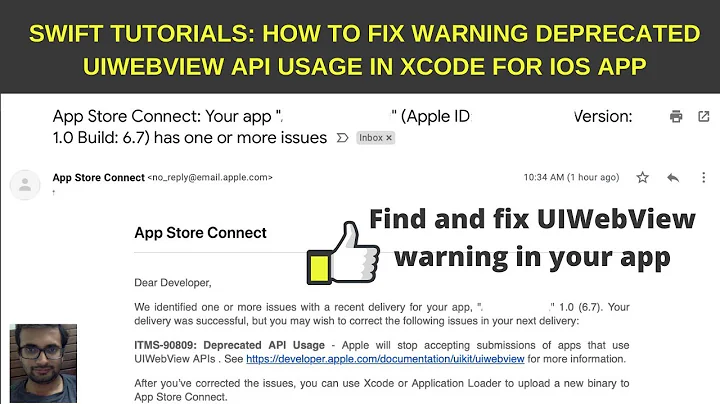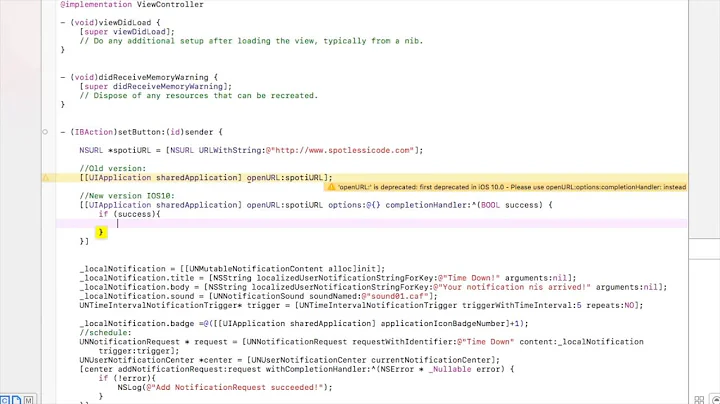openURL: deprecated in iOS 10
Solution 1
Write like this.
Handle completionHandler
UIApplication *application = [UIApplication sharedApplication];
NSURL *URL = [NSURL URLWithString:@"http://www.google.com"];
[application openURL:URL options:@{} completionHandler:^(BOOL success) {
if (success) {
NSLog(@"Opened url");
}
}];
Without handling completionHandler
[application openURL:URL options:@{} completionHandler:nil];
Solution 2
Apple introduced the openURL: method as a way to open external links with iOS 2. The related function canOpenURL: got some privacy controls in iOS 9 to stop you from querying devices for installed apps. Now with iOS 10 Apple has deprecated the plain old openURL for openURL:options:completionHandler:.
Here is my quick guide to what you need to know to open an external link with iOS 10.
The now deprecated method has a single parameter for the URL to open and returns a boolean to report success or failure:
// Objective-C
- (BOOL)openURL:(NSURL*)url
// Swift
open func canOpenURL(_ url: URL) -> Bool
The new method in iOS 10:
// Objective-C
- (void)openURL:(NSURL*)url options:(NSDictionary<NSString *, id> *)options
completionHandler:(void (^ __nullable)(BOOL success))completion
// Swift
open func open(_ url: URL, options: [String : Any] = [:],
completionHandler completion: (@escaping (Bool) -> Swift.Void)? = nil)
There are now three parameters:
- The URL to open
- An options dictionary (see below for valid
entries). Use an empty dictionary for the same behaviour as
openURL:. - A completion handler called on the main queue with the success. Nullable if you are not interested in the status.
Opening a URL with iOS 10
What does this mean if you have an iOS 10 only app, don’t care about options and completion status and just want to stop Xcode complaining:
// Objective-C
UIApplication *application = [UIApplication sharedApplication];
[application openURL:URL options:@{} completionHandler:nil];
// Swift
UIApplication.shared.open(url, options: [:], completionHandler: nil)
In practise as long as you are still supporting iOS 9 or earlier you will want to fallback to the plain old openURL method. Let’s look at an example where do that and also use the completion handler to check the status of the open:
First with Objective-C:
- (void)openScheme:(NSString *)scheme {
UIApplication *application = [UIApplication sharedApplication];
NSURL *URL = [NSURL URLWithString:scheme];
if ([application respondsToSelector:@selector(openURL:options:completionHandler:)]) {
[application openURL:URL options:@{}
completionHandler:^(BOOL success) {
NSLog(@"Open %@: %d",scheme,success);
}];
} else {
BOOL success = [application openURL:URL];
NSLog(@"Open %@: %d",scheme,success);
}
}
// Typical usage
[self openScheme:@"tweetbot://timeline"];
I am passing an empty dictionary for the options and I don’t do anything useful in the completion handler other than log the success. The Swift version:
func open(scheme: String) {
if let url = URL(string: scheme) {
if #available(iOS 10, *) {
UIApplication.shared.open(url, options: [:],
completionHandler: {
(success) in
print("Open \(scheme): \(success)")
})
} else {
let success = UIApplication.shared.openURL(url)
print("Open \(scheme): \(success)")
}
}
}
// Typical usage
open(scheme: "tweetbot://timeline")
Options
The UIApplication header file lists a single key for the options dictionary:
-
UIApplicationOpenURLOptionUniversalLinksOnly: Use a boolean value set to true (YES) to only open the URL if it is a valid universal link with an application configured to open it. If there is no application configured or the user disabled using it to open the link the completion handler is called with false (NO).
To override the default behaviour create a dictionary with the key set to true (YES) and pass it as the options parameter:
// Objective-C
NSDictionary *options = @{UIApplicationOpenURLOptionUniversalLinksOnly : @YES};
[application openURL:URL options:options completionHandler:nil];
// Swift
let options = [UIApplicationOpenURLOptionUniversalLinksOnly : true]
UIApplication.shared.open(url, options: options, completionHandler: nil)
So for example if I set this to true and try to open the URL https://twitter.com/kharrison it will fail if I do not have the Twitter app installed instead of opening the link in Safari.
Refrence : openURL: deprecated in iOS 10
Solution 3
// Objective-C
UIApplication *application = [UIApplication sharedApplication];
[application openURL:URL options:@{} completionHandler:nil];
// Swift
UIApplication.shared.open(url, options: [:], completionHandler: nil)
Solution 4
Swift 5.0.1 and above
UIApplication.shared.open(URL.init(string: UIApplication.openSettingsURLString)!)
Solution 5
// In Xcode 9 and iOS 11
UIApplication *application = [UIApplication sharedApplication];
NSURL *URL = [NSURL URLWithString:@"http://facebook.com"];
[application openURL:URL options:@{} completionHandler:^(BOOL success) {
if (success) {
NSLog(@"Opened url");
}
}];
Related videos on Youtube
Joannes
Updated on January 22, 2021Comments
-
 Joannes over 3 years
Joannes over 3 yearsApple with iOS 10 has deprecated
openURL: for openURL:option:completionHandlerIf I have:[[UIApplication sharedApplication] openURL:[NSURL URLWithString:@"https://www.google.com"]];How it will become?
options:<#(nonnull NSDictionary<NSString *,id> *)#>in detail[[UIApplication sharedApplication] openURL:[NSURL URLWithString:@"https://www.google.com"] options:<#(nonnull NSDictionary<NSString *,id> *)#> completionHandler:nil];Thanks
Update
options:@{}For empty dictionary with no key and value http://useyourloaf.com/blog/querying-url-schemes-with-canopenurl/-
 Dev Sanghani over 7 yearsThe options dictionary is described in both answers here.
Dev Sanghani over 7 yearsThe options dictionary is described in both answers here. -
 rmaddy over 7 yearsBTW - If your app still support iOS 9 or lower, just keep using the old
rmaddy over 7 yearsBTW - If your app still support iOS 9 or lower, just keep using the oldopenURL. You should only move to the new one if your Deployment Target is iOS 10. -
 Joannes over 7 yearsobviously in UIKit.framework this is commented!
Joannes over 7 yearsobviously in UIKit.framework this is commented! -
 KSigWyatt over 7 yearsPossible duplicate of OpenURL in iOS10
KSigWyatt over 7 yearsPossible duplicate of OpenURL in iOS10
-
-
 Nirav D over 7 yearsCheck this tutorial for more detail useyourloaf.com/blog/querying-url-schemes-with-canopenurl
Nirav D over 7 yearsCheck this tutorial for more detail useyourloaf.com/blog/querying-url-schemes-with-canopenurl -
 Joannes over 7 years@{} for what use?
Joannes over 7 years@{} for what use? -
 Nirav D over 7 yearsFor empty dictionary with no key and value.
Nirav D over 7 yearsFor empty dictionary with no key and value. -
Learn Swift over 7 yearsIn keyboard extension and iOS10 without shared Application how you can do it?
-
 iPhoneDeveloper over 6 yearsHi @NiravD I am trying to open a URL in wkwebview. How do i achieve the same without using openURL? openURL uses browser, i am trying to open a url within my application using webkit.
iPhoneDeveloper over 6 yearsHi @NiravD I am trying to open a URL in wkwebview. How do i achieve the same without using openURL? openURL uses browser, i am trying to open a url within my application using webkit. -
 Nirav D over 6 years@iPhoneKar You need to make
Nirav D over 6 years@iPhoneKar You need to makeNSURLRequestfromURLand then need to callloadRequestmethod on youWKWebViewobject. -
Sanjeevcn about 4 yearsYou can even omit options and completionHandler parameters because they are initialised by default to [:] and nil values respectively. Just keep UIApplication.shared.open(url)
-
 samezedi about 3 yearsWhere should this be added
samezedi about 3 yearsWhere should this be added






